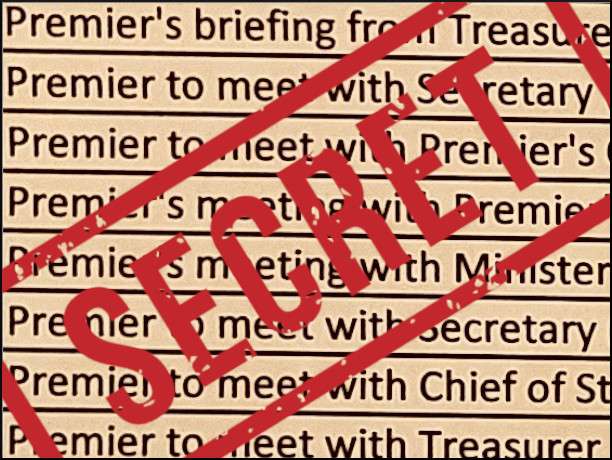Will Tasmanians get to see who government ministers really meet?

Neither the Liberal nor Labor party have committed to reintroducing what was once Australia’s greatest level of public disclosure of ministerial meetings if they win government at this weekend’s election.
Tasmanian Inquirer asked Premier Jeremy Rockliff whether he would reinstate the best-practice disclosure that was in place in the state between 2009 and 2014.
Rockliff’s responded that there was no release of ministerial diaries under the Labor-Greens government, and that the Liberal party had introduced the practice in line with “a nationwide approach in some states”. “It is one area amongst many others where we have increased transparency and accountability,” he said.
In reality, the Department of Premier and Cabinet agreed to disclose then premier David Bartlett’s appointments diary in 2009 following a Freedom of Information request by the author. The details disclosed were comprehensive: meetings with departmental officials, other MPs, party events, and lobbyists, along with details of who attended the meetings, their purpose and duration.
“With today’s technology, there’s no reason the public shouldn’t expect something closer to real-time publication of Ministerial diaries.”
Meg Webb
While the request was only for three months, Bartlett instituted the ongoing disclosure of the diary covering all his portfolios. Bartlett’s decision ensured Tasmania became the first jurisdiction in Australia to disclose the premier’s appointment diary.
This continued during the Labor-Green government between 2010 and 2014, but was abandoned following the Liberal party’s 2014 election win.
Tasmania’s example sparked interest in other states, with Queensland instituting disclosure in 2014 and New South Wales and the ACT following in 2015 and 2018 respectively. Victoria began disclosing ministerial diaries in February.
A Tasmanian revival
Tasmania’s near decade-long lack of disclosure came to a halt when the independent member for Nelson, Meg Webb, moved a motion in the Legislative Council supporting the mandatory disclosure of ministerial diaries and public consultation on the details of the exact scheme. Facing possible defeat, the government backed the motion.
But the government did not consult publicly on the issue and opted for a minimal level of disclosure. It did not release details of “internal meetings held by ministers with other ministers, ministerial staff, parliamentarians, or departmental officials, or meetings that are strictly personal, electorate or party/political meetings”, according to Rockliff’s first disclosure. It was a radical departure from the Bartlett-era approach, rendering invisible meetings with government officials and attendance at party events.
Labor’s recently released government integrity policy said they would introduce the mandatory disclosure of lobbyists’ meetings with politicians, their offices and senior officials if they won power, but did not identify other improvements to ministerial diaries disclosure. Shadow Attorney General Ella Haddad accused the Liberal government of hiding information from the public. “When they do look like they are making moves to provide information, they only provide half the picture,” she said.
It remains unclear whether Labor would reinstate disclosure of a broader range of meetings, such as those with government officials, other MPs and political party events, or increase the frequency of disclosure. Haddad said a Labor government would “implement new integrity standards that fit contemporary expectations and increase transparency”.
Webb said ministerial diaries should be disclosed more frequently than the government’s current quarterly schedule. She said Tasmanians should be able to see who had met with ministers about legislation before it was passed by parliament.
“While monthly diary disclosure appears to be best practice, with today’s technology, there’s no reason the public shouldn’t expect something closer to real-time publication of ministerial diaries,” she said.
Webb called on the next government to commit to legislating best practice disclosure of ministerial diaries. “This would include publishing details of all official meetings, both in the office and offsite (and including those attended by ministerial advisors only), all scheduled phone calls, and all events attended by a minister in an official capacity,” she said. “Details of those meetings should identify those present and key issues discussed. Records should be published in a timely manner and in an accessible, searchable and exportable format to enable scrutiny.”
Comment was sought from the Tasmanian Greens, but no response was received.
 @BobBurtonoz
@BobBurtonoz